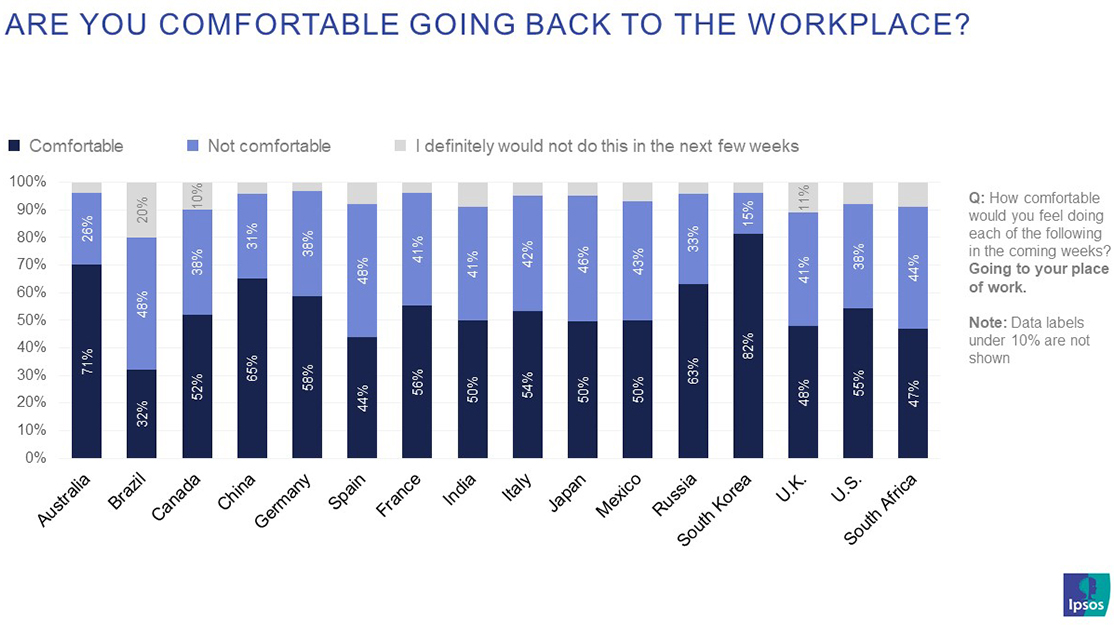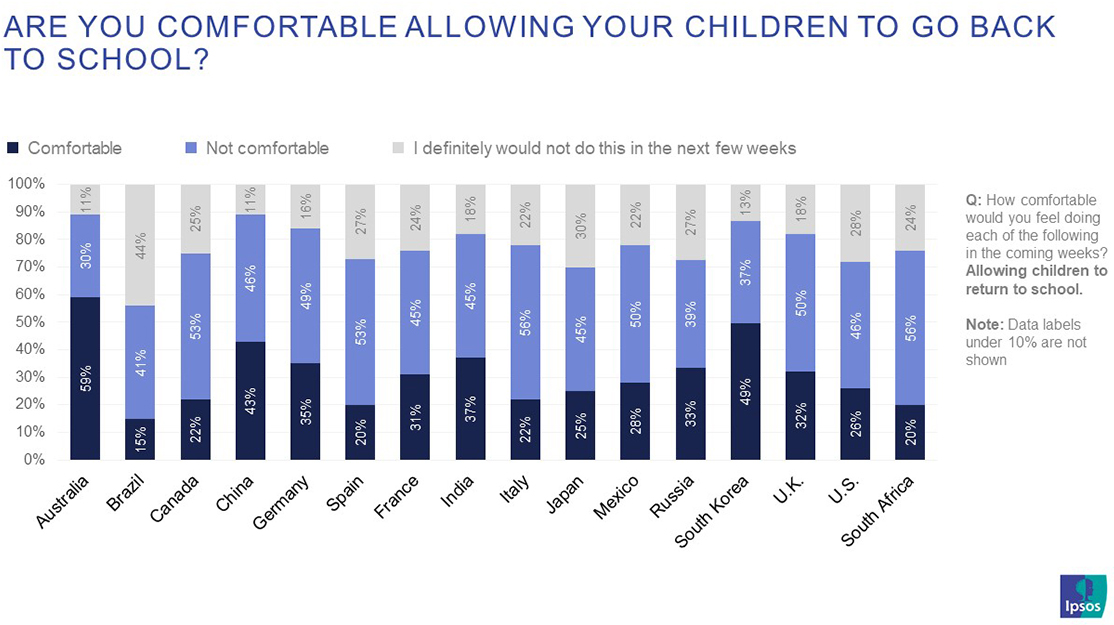South Africans reluctant to send children back to school
Angie Motshekga, Minister of Basic Education announced yesterday that Grade 7 and Grade 12 students will return to school on the 1st of June this year. She further announced the precautions required to keep students and teachers safe, but added that it’s impossible to guarantee that no one will be infected with the coronavirus. Since it’s up to parents to decide whether to send their children back to school or not, it is relevant to look at the view of parents regarding this issue.
Only two in every ten (20%) online South Africans are either “very comfortable” or “somewhat comfortable” allowing their children to return, according to the latest Ipsos Essentials survey. This study is conducted online, and so represents the views of those South Africans who have regular access to the internet. Almost a third (31%) worldwide are comfortable sending their children back. Despite having to home school those that don’t go back, a quarter of online South Africans (24%) say they will definitely not send their children to school in the next few weeks. Four out of every five online South Africans are thus opposed to sending their children back to school at this stage.

The opinions of online employed South Africans are split about returning to work. Almost half of working South Africans (47%) feel comfortable, while the other half (52%) are not comfortable returning to work, or say they won’t return to work in the next few weeks. Worldwide, more than half (55%) are comfortable returning to work.

As shown overleaf, South Africans are not alone in feeling apprehensive about sending children back to school or resuming their normal working routine. While some people worldwide say they are comfortable going back to their place of work in the coming weeks, they don’t feel the same about allowing their children to return to school amid the coronavirus pandemic.
Citizens of South Korea (82%), Australia (71%), China (65%), Russia (63%) and Germany (58%) are at the top of the list of those saying they are comfortable returning to work.
The countries most uncomfortable with returning to the workplace are Brazil (48%) and Spain (48%), with, one in five people (20%) in Brazil saying they definitely would not do this in the next few weeks.
Meanwhile, respondents most divided are in South Africa, closely followed by Spain and Japan, followed by the United Kingdom and Mexico.

In terms of children returning to school, the majority of respondents in Italy and South Africa (56%), followed by Canada and Spain (53%), are “not comfortable” with doing this in the coming weeks.
People in Brazil are the most against children returning to school, with more than two in five respondents (44%) saying they definitely wouldn’t do this, followed by Japan (30%), and the United States (28%).
There are only two countries where people are fairly comfortable with allowing their children to return to school – Australia (59%) and South Korea (49%).
The countries most divided on this are some of the world’s biggest emerging markets, including China with 3 percentage-points difference, separating those that are comfortable from those that are not, followed by Russia and India.

About the Study
- These are the results of an Ipsos survey conducted May 7th to 10th, 2020 on the Global Advisor online platform among 16,000 adults aged 18-74 in Canada and the United States and 16-74 in Australia, Brazil, China, France, Germany, Italy, Spain, India, Japan, Mexico, Russia, South Africa, South Korea and the United Kingdom.
- The sample for this study consists of approximately 1,000 individuals in each country. The samples in Australia, Canada, France, Germany, Italy, Spain, Japan, South Korea, the U.K. and the U.S. can be taken as representative of these countries’ general adult population over age 16 or 18 (as above) and under the age of 75. The sample in Brazil, China, India, Mexico, Russia, and South Africa is more urban, more educated and/or more affluent than the general population and should be viewed as reflecting the views of the more “connected” segment of the population. The data is weighted so that each market’s sample composition best reflects the demographic profile of the adult population according to the most recent census data.
- • Where results do not sum to 100 or the ‘difference’ appears to be +/-1 more/less than the actual, this may be due to rounding, multiple responses or the exclusion of don't knows or not stated responses. The precision of Ipsos online polls are calculated using a credibility interval with a poll of 1,000 accurate to +/- 3.5 percentage points. For more information on the Ipsos use of credibility intervals, please visit the Ipsos website (www.ipsos.com).
For more information on this news release, please contact:
|
Mari Harris |
Ezethu Mandlelize |
About Ipsos
- Ipsos is the world’s third largest market research company, present in 90 markets and employing more than 18,000 people.
- Our passionately curious research professionals, analysts and scientists have built unique multi-specialist capabilities that provide the true understanding and powerful insights into the actions, opinions and motivations of citizens, consumers, patients, customers or employees. We serve more than 5,000 clients across the world with 75 business solutions.
- Founded in France in 1975, Ipsos is listed on Euronext Paris since July 1st, 1999. The company is part of the SBF 120 and the Mid-60 index and is eligible for the Deferred Settlement Service (SRD).
- ISIN code FR0000073298, Reuters IPSOS.PA, Bloomberg IPS: FP www.ipsos.com



